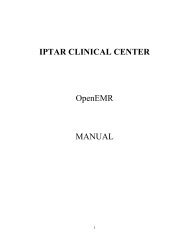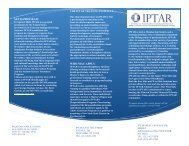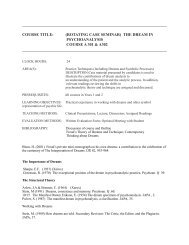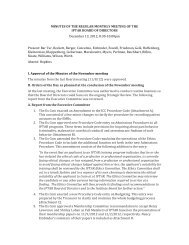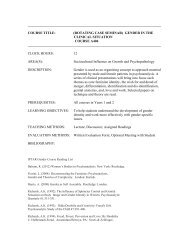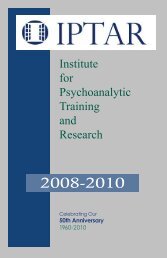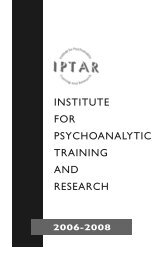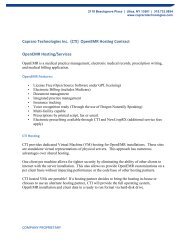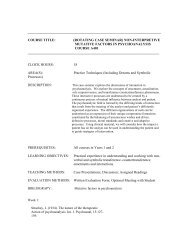IPTAR Bulletin - Institute for Psychoanalytic Training and Research
IPTAR Bulletin - Institute for Psychoanalytic Training and Research
IPTAR Bulletin - Institute for Psychoanalytic Training and Research
Create successful ePaper yourself
Turn your PDF publications into a flip-book with our unique Google optimized e-Paper software.
10<br />
Latency <strong>and</strong> Adolescence<br />
(Eight Weeks)<br />
Keith Westerfield, Ph.D.<br />
This course begins with the latency period <strong>and</strong> emphasizes the structural<br />
achievements that take place when the child is no longer as burdened by the<br />
conflict-ridden wishes <strong>and</strong> fears of the Oedipus Complex. The reactivation<br />
of the Oedipus Complex during puberty <strong>and</strong> adolescence leads to attempts<br />
to relinquish infantile objects <strong>and</strong> wishes in favor of contemporary objects who<br />
can satisfy stage-specific needs. Coursework will focus on the elaboration<br />
<strong>and</strong> modification of psychic structure in early, middle, <strong>and</strong> late adolescence.<br />
Theoretical issues will be organized around clinical material.<br />
II. THE EVOLUTION OF PSYCHOANALYTIC THEORY<br />
From Symptom to Psyche: The Emergence of Psychoanalysis<br />
(Eight Weeks)<br />
Fredric T. Perlman, Ph.D.<br />
This course will trace the emergence of psychoanalysis from its origins in<br />
Freud’s early work as a neurologist to the first exposition of his general theory<br />
of mind. Coursework will begin with a survey of the dominant paradigms<br />
of nineteenth century medicine <strong>and</strong> neurology in which Freud was trained.<br />
The course will then proceed to examine Freud’s ef<strong>for</strong>ts to underst<strong>and</strong> the<br />
nature of hysteria <strong>and</strong> other neurotic disorders, his clinical experiences<br />
using hypnosis, his development of the free association technique, <strong>and</strong> his<br />
discovery of the dynamic unconscious as a universal determinant of mental<br />
life. The course will conclude with a detailed study of the topographic model<br />
of mind presented in Chapter Seven of The Interpretation of Dreams.<br />
The Evolution of Freud’s Libido Theory <strong>and</strong> its Applications to an<br />
Underst<strong>and</strong>ing of Normal <strong>and</strong> Pathological Development<br />
(Eight Weeks)<br />
Elliot Kronish, Ph.D.<br />
This course begins with an examination of Freud’s evolving ideas on the libido<br />
theory <strong>and</strong> its implications <strong>for</strong> both normal <strong>and</strong> pathological development.<br />
The use of the theory as applied to symptom <strong>for</strong>mation, character development,<br />
<strong>and</strong> normal mental functioning will be highlighted. The course will then turn to<br />
Freud’s introduction of narcissism into libido theory <strong>and</strong> its relationship to<br />
aspects of psychic functioning such as types of object choice, love, self-esteem,<br />
the ego-ideal, <strong>and</strong> the tensions between wishful fantasy <strong>and</strong> reality. Both<br />
healthy <strong>and</strong> pathological manifestation of narcissistic development will be discussed.<br />
The ways in which the theory of narcissism impacted on the further<br />
development of Freud’s theoretical models will also be considered.<br />
The Revolution of 1919<br />
(Eight Weeks)<br />
Margaret Beaudoin, Ph.D. / Norbert Freedman, Ph.D. (alternating years)<br />
This course begins with Freud’s encounter with certain kinds of difficult patients<br />
whose conflicts led them to a "negative therapeutic reaction." It examines<br />
how these technical as well as theoretical difficulties led Freud to new<br />
ideas about his dual instinct theory, as well as to the conceptualization of the<br />
structural point of view, that is in terms of id, ego, <strong>and</strong> superego, in addition to<br />
defining the mind along topographic lines (conscious, preconscious, <strong>and</strong> unconscious).<br />
Again, the technical implications of these revisions, especially in<br />
dealing with sado-masochism <strong>and</strong> with severe anxiety states,will be examined.<br />
Revisiting, Rethinking, <strong>and</strong> Continuing Change<br />
(Eight Weeks)<br />
Alan Bass, Ph.D.<br />
Freud regularly sought to test his basic concepts by re-examining earlier clinical<br />
issues. This course concludes this full-year sequence on Freud’s contributions<br />
by examining Freud’s evaluation of his legacy in "Analysis Terminable<br />
<strong>and</strong> Interminable" <strong>and</strong> by considering the new emphases <strong>and</strong> ideas he introduced<br />
in late papers <strong>and</strong> in his "Outline of Psychoanalysis." These late writings<br />
suggest many of the central issues that analysts continue to explore in the<br />
decades following Freud’s death.<br />
III. CLINICAL APPLICATIONS<br />
Basic <strong>Psychoanalytic</strong> Concepts: Clinical Seminar<br />
(Thirty-two Weeks)<br />
Janet Fisher, Ph.D. (1 <strong>and</strong> 11)<br />
Carolyn Feigelson, Ph.D./Judith Lasky, Ph.D. (111 <strong>and</strong> 1V, alternating years)<br />
This year long clinical seminar introduces c<strong>and</strong>idates to basic psychoanalytic<br />
concepts through presentation <strong>and</strong> discussion of psychotherapy cases from<br />
their clinical practices.Topics such as free association, resistance, unconscious<br />
fantasy, compromise <strong>for</strong>mation, transference, use of countertransference,<br />
therapeutic alliance, enactment, dreams, as well as interpretation <strong>and</strong> other<br />
interventions (including ‘parameters’) will be explored in the context of c<strong>and</strong>idate<br />
presentations.The course will begin with a review of Freud’s writings<br />
on technique; other readings may be assigned <strong>and</strong> discussed throughout the<br />
year based on the needs of the group. However, this is primarily a clinical<br />
seminar, <strong>and</strong> the main focus will be on the discussion of clinical process as it<br />
reveals basic psychoanalytic concepts.<br />
11




